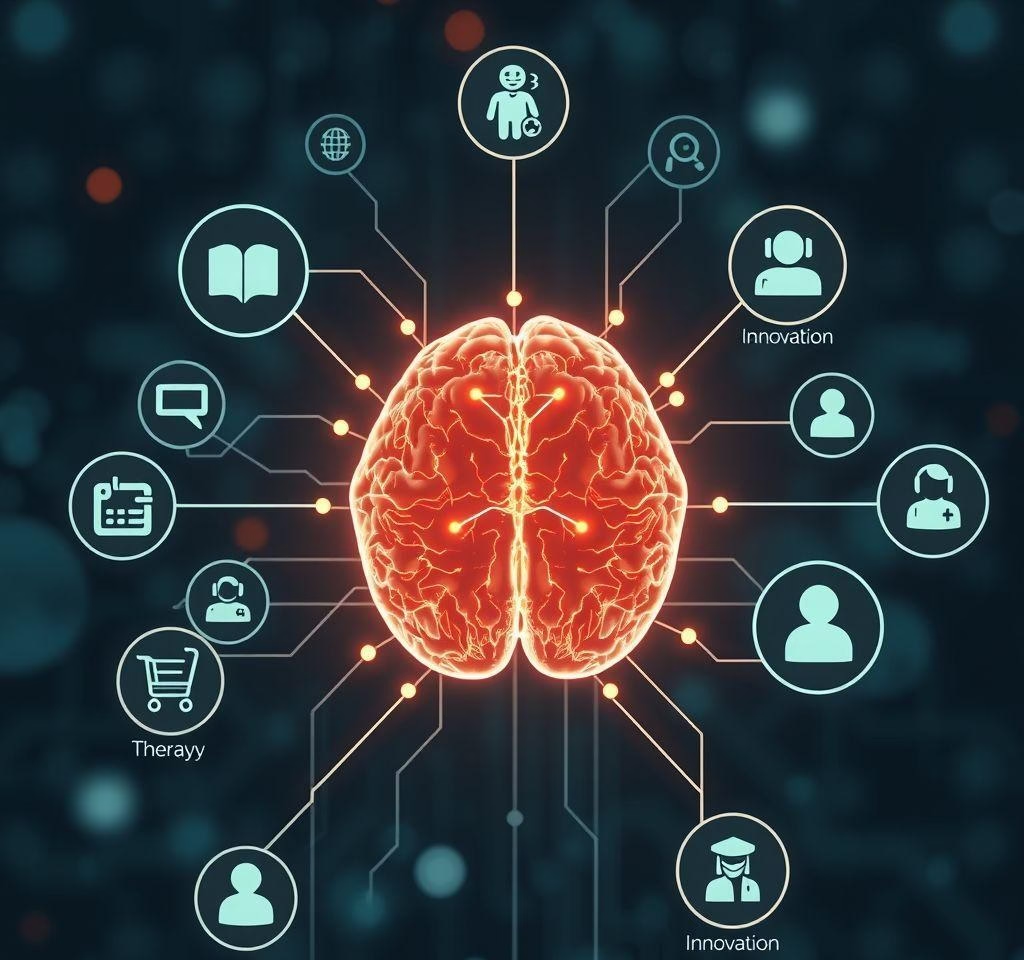AI for Mental Health Analysis: Transforming Mental Health Care
AI for Mental Health Analysis represents a groundbreaking shift in how we approach psychological care. By combining cutting-edge technology with clinical expertise, this field offers unprecedented opportunities to diagnose conditions earlier, personalize treatments, and improve patient outcomes. This article explores the technological innovations, ethical considerations, and transformative potential shaping the future of mental healthcare.
Overview of AI in Mental Health
Overview of AI in Mental Health
Artificial intelligence (AI) offers transformative potential for mental healthcare. Machine learning algorithms analyze vast datasets of patient information, identifying patterns and insights undetectable by humans. Natural language processing empowers systems to understand and interpret human language, facilitating improved communication and diagnosis. Predictive analytics helps anticipate potential crises, enabling proactive intervention.
AI-driven tools are already making an impact.
- Chatbots provide readily available support and guidance.
- Mood tracking apps offer personalized monitoring and feedback.
- Neural network-driven diagnostics aid in more accurate and efficient evaluations.
These applications are enhancing access to care and personalizing treatment plans. Further development promises even more sophisticated and effective solutions for mental health challenges.
AI in Diagnosing Mental Health Disorders
Overview of AI in Mental Health
Artificial intelligence (AI) offers transformative potential for mental healthcare. Machine learning algorithms analyze vast datasets of patient information, identifying patterns and insights undetectable by humans. Natural language processing empowers systems to understand and interpret human language, facilitating improved communication and diagnosis. Predictive analytics helps anticipate potential crises, enabling proactive intervention.
AI-driven tools are already making an impact.
- Chatbots provide readily available support and guidance.
- Mood tracking apps offer personalized monitoring and feedback.
- Neural network-driven diagnostics aid in more accurate and efficient evaluations.
These applications are enhancing access to care and personalizing treatment plans. Further development promises even more sophisticated and effective solutions for mental health challenges.
Personalized Treatment Plans with AI
Overview of AI in Mental Health
Artificial intelligence (AI) offers transformative potential for mental healthcare. Machine learning algorithms analyze vast datasets of patient information, identifying patterns and insights undetectable by humans. Natural language processing empowers systems to understand and interpret human language, facilitating improved communication and diagnosis. Predictive analytics helps anticipate potential crises, enabling proactive intervention.
AI-driven tools are already making an impact.
- Chatbots provide readily available support and guidance.
- Mood tracking apps offer personalized monitoring and feedback.
- Neural network-driven diagnostics aid in more accurate and efficient evaluations.
These applications are enhancing access to care and personalizing treatment plans. Further development promises even more sophisticated and effective solutions for mental health challenges.
Ethical and Privacy Considerations
Overview of AI in Mental Health
Artificial intelligence (AI) offers transformative potential for mental healthcare. Machine learning algorithms analyze vast datasets of patient information, identifying patterns and insights undetectable by humans. Natural language processing empowers systems to understand and interpret human language, facilitating improved communication and diagnosis. Predictive analytics helps anticipate potential crises, enabling proactive intervention.
AI-driven tools are already making an impact.
- Chatbots provide readily available support and guidance.
- Mood tracking apps offer personalized monitoring and feedback.
- Neural network-driven diagnostics aid in more accurate and efficient evaluations.
These applications are enhancing access to care and personalizing treatment plans. Further development promises even more sophisticated and effective solutions for mental health challenges.
The Future of AI-Driven Mental Health Care
Overview of AI in Mental Health
Artificial intelligence (AI) offers transformative potential for mental healthcare. Machine learning algorithms analyze vast datasets of patient information, identifying patterns and insights undetectable by humans. Natural language processing empowers systems to understand and interpret human language, facilitating improved communication and diagnosis. Predictive analytics helps anticipate potential crises, enabling proactive intervention.
AI-driven tools are already making an impact.
- Chatbots provide readily available support and guidance.
- Mood tracking apps offer personalized monitoring and feedback.
- Neural network-driven diagnostics aid in more accurate and efficient evaluations.
These applications are enhancing access to care and personalizing treatment plans. Further development promises even more sophisticated and effective solutions for mental health challenges.
Overview of AI in Mental Health
AI in Diagnosing Mental Health Disorders
AI is showing promise in assisting with the diagnosis of mental health disorders. Algorithms analyze various data points, including speech patterns, facial expressions, and behavioral data. These analyses can aid in the early detection of conditions such as depression and anxiety.
Studies have shown that AI can achieve accuracy rates comparable to, and in some cases exceeding, those of human experts. However, more research is needed to fully validate these findings and to address potential biases in the data used to train AI models. The analysis of subtle cues in speech and facial expressions can provide valuable insights for clinicians. This helps them to form more comprehensive and personalized diagnoses.
It’s important to note that AI diagnostic tools are intended to augment, not replace, human expertise. Ethical considerations surrounding data privacy, algorithmic bias, and the potential impact on the clinician-patient relationship require careful attention. Further research and development will be critical in refining these tools and addressing these important concerns.
AI in Diagnosing Mental Health Disorders
AI in Diagnosing Mental Health Disorders
AI is showing promise in assisting with the diagnosis of mental health disorders. Algorithms analyze various data points, including speech patterns, facial expressions, and behavioral data. These analyses can aid in the early detection of conditions such as depression and anxiety.
Studies have shown that AI can achieve accuracy rates comparable to, and in some cases exceeding, those of human experts. However, more research is needed to fully validate these findings and to address potential biases in the data used to train AI models. The analysis of subtle cues in speech and facial expressions can provide valuable insights for clinicians. This helps them to form more comprehensive and personalized diagnoses.
It’s important to note that AI diagnostic tools are intended to augment, not replace, human expertise. Ethical considerations surrounding data privacy, algorithmic bias, and the potential impact on the clinician-patient relationship require careful attention. Further research and development will be critical in refining these tools and addressing these important concerns.
Personalized Treatment Plans with AI
AI in Diagnosing Mental Health Disorders
AI is showing promise in assisting with the diagnosis of mental health disorders. Algorithms analyze various data points, including speech patterns, facial expressions, and behavioral data. These analyses can aid in the early detection of conditions such as depression and anxiety.
Studies have shown that AI can achieve accuracy rates comparable to, and in some cases exceeding, those of human experts. However, more research is needed to fully validate these findings and to address potential biases in the data used to train AI models. The analysis of subtle cues in speech and facial expressions can provide valuable insights for clinicians. This helps them to form more comprehensive and personalized diagnoses.
It’s important to note that AI diagnostic tools are intended to augment, not replace, human expertise. Ethical considerations surrounding data privacy, algorithmic bias, and the potential impact on the clinician-patient relationship require careful attention. Further research and development will be critical in refining these tools and addressing these important concerns.
Ethical and Privacy Considerations
AI in Diagnosing Mental Health Disorders
AI is showing promise in assisting with the diagnosis of mental health disorders. Algorithms analyze various data points, including speech patterns, facial expressions, and behavioral data. These analyses can aid in the early detection of conditions such as depression and anxiety.
Studies have shown that AI can achieve accuracy rates comparable to, and in some cases exceeding, those of human experts. However, more research is needed to fully validate these findings and to address potential biases in the data used to train AI models. The analysis of subtle cues in speech and facial expressions can provide valuable insights for clinicians. This helps them to form more comprehensive and personalized diagnoses.
It’s important to note that AI diagnostic tools are intended to augment, not replace, human expertise. Ethical considerations surrounding data privacy, algorithmic bias, and the potential impact on the clinician-patient relationship require careful attention. Further research and development will be critical in refining these tools and addressing these important concerns.
The Future of AI-Driven Mental Health Care
AI in Diagnosing Mental Health Disorders
AI is showing promise in assisting with the diagnosis of mental health disorders. Algorithms analyze various data points, including speech patterns, facial expressions, and behavioral data. These analyses can aid in the early detection of conditions such as depression and anxiety.
Studies have shown that AI can achieve accuracy rates comparable to, and in some cases exceeding, those of human experts. However, more research is needed to fully validate these findings and to address potential biases in the data used to train AI models. The analysis of subtle cues in speech and facial expressions can provide valuable insights for clinicians. This helps them to form more comprehensive and personalized diagnoses.
It’s important to note that AI diagnostic tools are intended to augment, not replace, human expertise. Ethical considerations surrounding data privacy, algorithmic bias, and the potential impact on the clinician-patient relationship require careful attention. Further research and development will be critical in refining these tools and addressing these important concerns.
Overview of AI in Mental Health
Personalized Treatment Plans with AI
AI is transforming mental healthcare by enabling the creation of personalized treatment plans. Advanced algorithms analyze patient data to generate tailored therapy regimens, medication recommendations, and preventative strategies against potential crises. This approach moves beyond a one-size-fits-all model, leading to more effective and efficient care.
Algorithms consider various factors, including a patient’s symptoms, medical history, lifestyle, and responses to previous treatments. This approach allows for the development of precise treatment plans that are specifically suited to each individual’s unique needs. Machine learning models can predict the likelihood of future crises. This can facilitate timely interventions, potentially preventing hospitalizations or other negative events.
Studies have shown that these AI-driven approaches can lead to significant improvements in patient outcomes. For example, one study showed a marked decrease in depressive symptoms among patients whose treatment plans were generated using AI. Another study demonstrated a reduction in relapse rates for individuals with anxiety disorders. However, it is crucial to ensure patient data privacy and address potential biases in algorithms to prevent discriminatory outcomes. As AI technology continues to evolve, these personalized approaches are expected to become more sophisticated and effective, improving mental healthcare delivery substantially.
AI in Diagnosing Mental Health Disorders
Personalized Treatment Plans with AI
AI is transforming mental healthcare by enabling the creation of personalized treatment plans. Advanced algorithms analyze patient data to generate tailored therapy regimens, medication recommendations, and preventative strategies against potential crises. This approach moves beyond a one-size-fits-all model, leading to more effective and efficient care.
Algorithms consider various factors, including a patient’s symptoms, medical history, lifestyle, and responses to previous treatments. This approach allows for the development of precise treatment plans that are specifically suited to each individual’s unique needs. Machine learning models can predict the likelihood of future crises. This can facilitate timely interventions, potentially preventing hospitalizations or other negative events.
Studies have shown that these AI-driven approaches can lead to significant improvements in patient outcomes. For example, one study showed a marked decrease in depressive symptoms among patients whose treatment plans were generated using AI. Another study demonstrated a reduction in relapse rates for individuals with anxiety disorders. However, it is crucial to ensure patient data privacy and address potential biases in algorithms to prevent discriminatory outcomes. As AI technology continues to evolve, these personalized approaches are expected to become more sophisticated and effective, improving mental healthcare delivery substantially.
Personalized Treatment Plans with AI
Personalized Treatment Plans with AI
AI is transforming mental healthcare by enabling the creation of personalized treatment plans. Advanced algorithms analyze patient data to generate tailored therapy regimens, medication recommendations, and preventative strategies against potential crises. This approach moves beyond a one-size-fits-all model, leading to more effective and efficient care.
Algorithms consider various factors, including a patient’s symptoms, medical history, lifestyle, and responses to previous treatments. This approach allows for the development of precise treatment plans that are specifically suited to each individual’s unique needs. Machine learning models can predict the likelihood of future crises. This can facilitate timely interventions, potentially preventing hospitalizations or other negative events.
Studies have shown that these AI-driven approaches can lead to significant improvements in patient outcomes. For example, one study showed a marked decrease in depressive symptoms among patients whose treatment plans were generated using AI. Another study demonstrated a reduction in relapse rates for individuals with anxiety disorders. However, it is crucial to ensure patient data privacy and address potential biases in algorithms to prevent discriminatory outcomes. As AI technology continues to evolve, these personalized approaches are expected to become more sophisticated and effective, improving mental healthcare delivery substantially.
Ethical and Privacy Considerations
Personalized Treatment Plans with AI
AI is transforming mental healthcare by enabling the creation of personalized treatment plans. Advanced algorithms analyze patient data to generate tailored therapy regimens, medication recommendations, and preventative strategies against potential crises. This approach moves beyond a one-size-fits-all model, leading to more effective and efficient care.
Algorithms consider various factors, including a patient’s symptoms, medical history, lifestyle, and responses to previous treatments. This approach allows for the development of precise treatment plans that are specifically suited to each individual’s unique needs. Machine learning models can predict the likelihood of future crises. This can facilitate timely interventions, potentially preventing hospitalizations or other negative events.
Studies have shown that these AI-driven approaches can lead to significant improvements in patient outcomes. For example, one study showed a marked decrease in depressive symptoms among patients whose treatment plans were generated using AI. Another study demonstrated a reduction in relapse rates for individuals with anxiety disorders. However, it is crucial to ensure patient data privacy and address potential biases in algorithms to prevent discriminatory outcomes. As AI technology continues to evolve, these personalized approaches are expected to become more sophisticated and effective, improving mental healthcare delivery substantially.
The Future of AI-Driven Mental Health Care
Personalized Treatment Plans with AI
AI is transforming mental healthcare by enabling the creation of personalized treatment plans. Advanced algorithms analyze patient data to generate tailored therapy regimens, medication recommendations, and preventative strategies against potential crises. This approach moves beyond a one-size-fits-all model, leading to more effective and efficient care.
Algorithms consider various factors, including a patient’s symptoms, medical history, lifestyle, and responses to previous treatments. This approach allows for the development of precise treatment plans that are specifically suited to each individual’s unique needs. Machine learning models can predict the likelihood of future crises. This can facilitate timely interventions, potentially preventing hospitalizations or other negative events.
Studies have shown that these AI-driven approaches can lead to significant improvements in patient outcomes. For example, one study showed a marked decrease in depressive symptoms among patients whose treatment plans were generated using AI. Another study demonstrated a reduction in relapse rates for individuals with anxiety disorders. However, it is crucial to ensure patient data privacy and address potential biases in algorithms to prevent discriminatory outcomes. As AI technology continues to evolve, these personalized approaches are expected to become more sophisticated and effective, improving mental healthcare delivery substantially.
Overview of AI in Mental Health
Ethical and Privacy Considerations
The deployment of AI in mental healthcare presents significant ethical and privacy challenges. Data privacy is paramount; robust safeguards are needed to protect sensitive patient information. Algorithmic bias must be addressed to prevent discriminatory outcomes. AI systems should not perpetuate existing societal biases.
Patient autonomy should be central. Individuals must have control over their data and the use of AI in their care. Transparency regarding AI’s role in decision-making is essential. Informed consent is critical before the deployment of AI-driven interventions.
Regulatory frameworks and ethical guidelines are needed to govern the use of AI in mental healthcare. These should ensure responsible innovation, while prioritizing patient safety and well-being. These guidelines need to account for the unique vulnerabilities of individuals with mental health conditions. Ongoing monitoring and evaluation are vital to ensure ethical AI implementation.
AI in Diagnosing Mental Health Disorders
Ethical and Privacy Considerations
The deployment of AI in mental healthcare presents significant ethical and privacy challenges. Data privacy is paramount; robust safeguards are needed to protect sensitive patient information. Algorithmic bias must be addressed to prevent discriminatory outcomes. AI systems should not perpetuate existing societal biases.
Patient autonomy should be central. Individuals must have control over their data and the use of AI in their care. Transparency regarding AI’s role in decision-making is essential. Informed consent is critical before the deployment of AI-driven interventions.
Regulatory frameworks and ethical guidelines are needed to govern the use of AI in mental healthcare. These should ensure responsible innovation, while prioritizing patient safety and well-being. These guidelines need to account for the unique vulnerabilities of individuals with mental health conditions. Ongoing monitoring and evaluation are vital to ensure ethical AI implementation.
Personalized Treatment Plans with AI
Ethical and Privacy Considerations
The deployment of AI in mental healthcare presents significant ethical and privacy challenges. Data privacy is paramount; robust safeguards are needed to protect sensitive patient information. Algorithmic bias must be addressed to prevent discriminatory outcomes. AI systems should not perpetuate existing societal biases.
Patient autonomy should be central. Individuals must have control over their data and the use of AI in their care. Transparency regarding AI’s role in decision-making is essential. Informed consent is critical before the deployment of AI-driven interventions.
Regulatory frameworks and ethical guidelines are needed to govern the use of AI in mental healthcare. These should ensure responsible innovation, while prioritizing patient safety and well-being. These guidelines need to account for the unique vulnerabilities of individuals with mental health conditions. Ongoing monitoring and evaluation are vital to ensure ethical AI implementation.
Ethical and Privacy Considerations
Ethical and Privacy Considerations
The deployment of AI in mental healthcare presents significant ethical and privacy challenges. Data privacy is paramount; robust safeguards are needed to protect sensitive patient information. Algorithmic bias must be addressed to prevent discriminatory outcomes. AI systems should not perpetuate existing societal biases.
Patient autonomy should be central. Individuals must have control over their data and the use of AI in their care. Transparency regarding AI’s role in decision-making is essential. Informed consent is critical before the deployment of AI-driven interventions.
Regulatory frameworks and ethical guidelines are needed to govern the use of AI in mental healthcare. These should ensure responsible innovation, while prioritizing patient safety and well-being. These guidelines need to account for the unique vulnerabilities of individuals with mental health conditions. Ongoing monitoring and evaluation are vital to ensure ethical AI implementation.
The Future of AI-Driven Mental Health Care
Ethical and Privacy Considerations
The deployment of AI in mental healthcare presents significant ethical and privacy challenges. Data privacy is paramount; robust safeguards are needed to protect sensitive patient information. Algorithmic bias must be addressed to prevent discriminatory outcomes. AI systems should not perpetuate existing societal biases.
Patient autonomy should be central. Individuals must have control over their data and the use of AI in their care. Transparency regarding AI’s role in decision-making is essential. Informed consent is critical before the deployment of AI-driven interventions.
Regulatory frameworks and ethical guidelines are needed to govern the use of AI in mental healthcare. These should ensure responsible innovation, while prioritizing patient safety and well-being. These guidelines need to account for the unique vulnerabilities of individuals with mental health conditions. Ongoing monitoring and evaluation are vital to ensure ethical AI implementation.
Overview of AI in Mental Health
The Future of AI-Driven Mental Health Care
AI’s role in mental healthcare is poised for significant advancements. Real-time emotion monitoring using physiological sensors and advanced algorithms will provide continuous assessments of mental state. This will enable timely interventions and personalized support.
Global accessibility will expand through widespread adoption of telemedicine platforms. These platforms can connect individuals with mental health professionals regardless of geographic location. This will significantly increase access to care, particularly in underserved areas.
Integration with wearable devices will facilitate continuous data collection. This includes sleep patterns, activity levels, and heart rate variability. This data can offer valuable insights into mental well-being, aiding in early detection of issues and personalized interventions.
These advancements are vital for democratizing access to mental health resources. AI can help overcome barriers such as cost, geographic limitations, and stigma. AI’s ability to personalize treatment and provide accessible care represents a transformative shift in how mental healthcare is delivered.
AI in Diagnosing Mental Health Disorders
The Future of AI-Driven Mental Health Care
AI’s role in mental healthcare is poised for significant advancements. Real-time emotion monitoring using physiological sensors and advanced algorithms will provide continuous assessments of mental state. This will enable timely interventions and personalized support.
Global accessibility will expand through widespread adoption of telemedicine platforms. These platforms can connect individuals with mental health professionals regardless of geographic location. This will significantly increase access to care, particularly in underserved areas.
Integration with wearable devices will facilitate continuous data collection. This includes sleep patterns, activity levels, and heart rate variability. This data can offer valuable insights into mental well-being, aiding in early detection of issues and personalized interventions.
These advancements are vital for democratizing access to mental health resources. AI can help overcome barriers such as cost, geographic limitations, and stigma. AI’s ability to personalize treatment and provide accessible care represents a transformative shift in how mental healthcare is delivered.
Personalized Treatment Plans with AI
The Future of AI-Driven Mental Health Care
AI’s role in mental healthcare is poised for significant advancements. Real-time emotion monitoring using physiological sensors and advanced algorithms will provide continuous assessments of mental state. This will enable timely interventions and personalized support.
Global accessibility will expand through widespread adoption of telemedicine platforms. These platforms can connect individuals with mental health professionals regardless of geographic location. This will significantly increase access to care, particularly in underserved areas.
Integration with wearable devices will facilitate continuous data collection. This includes sleep patterns, activity levels, and heart rate variability. This data can offer valuable insights into mental well-being, aiding in early detection of issues and personalized interventions.
These advancements are vital for democratizing access to mental health resources. AI can help overcome barriers such as cost, geographic limitations, and stigma. AI’s ability to personalize treatment and provide accessible care represents a transformative shift in how mental healthcare is delivered.
Ethical and Privacy Considerations
The Future of AI-Driven Mental Health Care
AI’s role in mental healthcare is poised for significant advancements. Real-time emotion monitoring using physiological sensors and advanced algorithms will provide continuous assessments of mental state. This will enable timely interventions and personalized support.
Global accessibility will expand through widespread adoption of telemedicine platforms. These platforms can connect individuals with mental health professionals regardless of geographic location. This will significantly increase access to care, particularly in underserved areas.
Integration with wearable devices will facilitate continuous data collection. This includes sleep patterns, activity levels, and heart rate variability. This data can offer valuable insights into mental well-being, aiding in early detection of issues and personalized interventions.
These advancements are vital for democratizing access to mental health resources. AI can help overcome barriers such as cost, geographic limitations, and stigma. AI’s ability to personalize treatment and provide accessible care represents a transformative shift in how mental healthcare is delivered.
The Future of AI-Driven Mental Health Care
The Future of AI-Driven Mental Health Care
AI’s role in mental healthcare is poised for significant advancements. Real-time emotion monitoring using physiological sensors and advanced algorithms will provide continuous assessments of mental state. This will enable timely interventions and personalized support.
Global accessibility will expand through widespread adoption of telemedicine platforms. These platforms can connect individuals with mental health professionals regardless of geographic location. This will significantly increase access to care, particularly in underserved areas.
Integration with wearable devices will facilitate continuous data collection. This includes sleep patterns, activity levels, and heart rate variability. This data can offer valuable insights into mental well-being, aiding in early detection of issues and personalized interventions.
These advancements are vital for democratizing access to mental health resources. AI can help overcome barriers such as cost, geographic limitations, and stigma. AI’s ability to personalize treatment and provide accessible care represents a transformative shift in how mental healthcare is delivered.
Final Words
AI-driven mental health analysis has already begun reshaping diagnosis and care delivery, but its full potential lies in balancing technological advancement with ethical responsibility. By prioritizing patient privacy, addressing algorithmic biases, and fostering interdisciplinary collaboration, the mental health community can harness AI to create equitable, accessible, and effective care systems that address both individual and societal needs.




